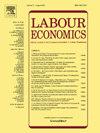Do sibling correlations in skills, schooling, and earnings vary by socioeconomic background? Insights from Sweden
IF 2.6
2区 经济学
Q2 ECONOMICS
引用次数: 0
Abstract
Family background shapes individual outcomes across the life cycle. While research documents how family background importance varies across countries, less is known about heterogeneities across socioeconomic groups within countries. Using comprehensive Swedish register data, we compare sibling correlations—a more holistic measure of family influence than direct parent–child associations—in skills, schooling, and earnings across fine-grained groups defined by parental socioeconomic status (SES). We find that sibling correlations generally decline with parental SES. This pattern holds across cognitive skills, schooling, and earnings, and is robust to alternative definitions of parental SES. The decline is particularly pronounced when comparing the lowest decile to higher SES groups. For education and earnings, the decline in sibling correlations at higher SES levels is primarily driven by increased within-family variation, suggesting siblings in advantaged families develop more individualized paths. For skills, the decline reflects decreasing between-family variation. This result is consistent with theories on reinforcing parental investments, though other mechanisms, including complementarities between investments and abilities, credit constraints faced by low-SES families and broader poverty traps, may also contribute. Our results suggest that children from low-SES backgrounds not only have worse average outcomes than those from high-SES homes but also face constraints on individual development. This study provides insights into how equality of opportunity varies across the socioeconomic spectrum, revealing nuances in family influence that country-level averages may obscure.
兄弟姐妹在技能、学校教育和收入方面的相关性是否因社会经济背景而异?来自瑞典的启示
家庭背景决定了个人在整个生命周期中的结果。虽然研究记录了家庭背景的重要性在各国之间的差异,但对各国社会经济群体之间的异质性知之甚少。利用瑞典的综合登记数据,我们比较了由父母社会经济地位(SES)定义的细粒度群体在技能、学校教育和收入方面的兄弟姐妹相关性(比直接的亲子关系更全面的家庭影响衡量标准)。我们发现兄弟姐妹的相关性通常随着父母的SES而下降。这种模式适用于认知技能、学校教育和收入,并且适用于父母社会经济地位的其他定义。当将最低的十分之一群体与较高的社会地位群体进行比较时,这种下降尤为明显。在教育和收入方面,社会经济地位越高,兄弟姐妹相关性的下降主要是由家庭内部差异的增加所驱动的,这表明优势家庭的兄弟姐妹发展出更个性化的道路。就技能而言,这种下降反映了家庭间差异的减少。这一结果与加强亲代投资的理论是一致的,尽管其他机制,包括投资与能力之间的互补性、低社会经济地位家庭面临的信贷限制和更广泛的贫困陷阱,也可能起作用。我们的研究结果表明,来自低社会经济地位家庭的孩子不仅平均成绩比来自高社会经济地位家庭的孩子差,而且在个体发展方面也面临限制。这项研究提供了机会平等如何在社会经济范围内变化的见解,揭示了国家平均水平可能掩盖的家庭影响的细微差别。
本文章由计算机程序翻译,如有差异,请以英文原文为准。
求助全文
约1分钟内获得全文
求助全文
来源期刊

Labour Economics
ECONOMICS-
CiteScore
3.60
自引率
8.30%
发文量
142
期刊介绍:
Labour Economics is devoted to publishing research in the field of labour economics both on the microeconomic and on the macroeconomic level, in a balanced mix of theory, empirical testing and policy applications. It gives due recognition to analysis and explanation of institutional arrangements of national labour markets and the impact of these institutions on labour market outcomes.
 求助内容:
求助内容: 应助结果提醒方式:
应助结果提醒方式:


